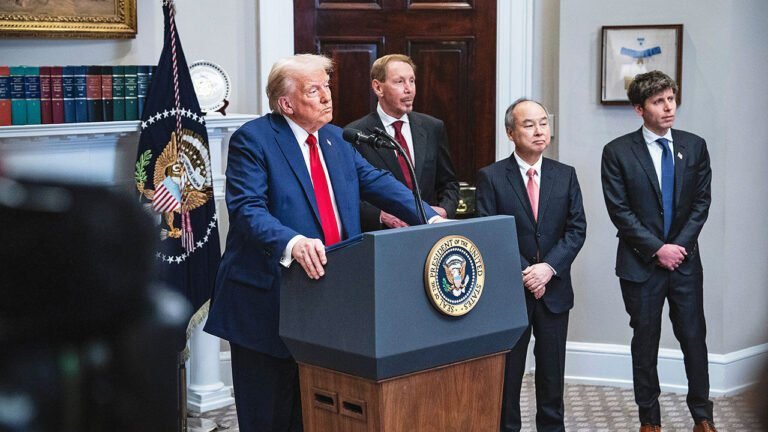President Trump’s Stargate Initiative: A Bold Venture into AI Infrastructure
On a brisk Tuesday morning, President Donald Trump unveiled Stargate, an ambitious plan intended to revolutionize artificial intelligence (AI) infrastructure in the United States. In an environment where AI is shaping industries and redefining the workforce, this $500 billion venture promises to be the largest of its kind in history. However, not everyone is on the same page regarding its funding, raising questions about the project’s viability and future impact.
What is Stargate?
Stargate is a privately funded initiative that aims to establish a robust AI infrastructure across the nation. Genealogically tied to prominent tech entities like OpenAI, Oracle, and SoftBank, the project is positioned to generate significant investments and innovation surrounding artificial general intelligence (AGI). Trump’s announcement emphasized that Stargate would not only initiate advancements in AI but also spur job creation over its four-year timeline.
Unpacking the Controversy
Despite the grand vision, recent comments from Elon Musk, now among Trump’s closest advisors, have stirred the pot. Responding to OpenAI’s statement about an immediate deployment of $100 billion, Musk remarked that SoftBank has secured "well under $10 billion" for the initiative. This revelation counters the optimistic projections set forth by Trump and highlights a significant gap between ambition and actual funding.
- Musk’s Perspective: Musk’s skepticism emphasizes that despite the hype, substantial financial backing may not have been cultivated as touted.
- OpenAI’s Response: In a spirited retort, OpenAI CEO Sam Altman invited Musk to see the progress made, further implying that Musk’s claims could be inaccurate.
The tension between Musk and Altman is palpable, rooted in a competitive landscape where Musk’s own venture, xAI, goes head-to-head with OpenAI.
The Broader Implications of Stargate
Understanding Stargate extends beyond a financial transaction; it taps into critical themes including technological advancement, labor markets, and national competitiveness. Here’s what you need to know:
- Job Creation: Trump positioned Stargate as a job creator, yet the details regarding how many jobs will truly be created and in what sectors remain unclear.
- Investment Trajectory: The promise of $500 billion raises questions about who will fund it and whether the private sector can mobilize such resources efficiently.
- AGI Aspirations: The vision of creating artificial general intelligence, a goal long pursued by many in the tech field, adds an ambitious layer to the project, but it also involves substantial ethical considerations.
Leading Figures Weigh In
The unveiling of Stargate has prompted responses from other tech leaders, showcasing a broad spectrum of opinions. When asked about Musk’s funding claims, Microsoft CEO Satya Nadella said, “I’m good for my $80 billion,” regarding Microsoft’s investment in AI infrastructure—a clear indication of corporate interest in AI advancements.
FAQs Regarding Stargate
What is the proposed timeline for Stargate?
The project is expected to evolve over four years, with immediate funding and deployment considerations.
Who finances Stargate?
While it is suggested to be a privately funded effort, the actual commitments from backers are under scrutiny, as indicated by Musk’s comments.
How will this project impact job markets?
Trump claims job creation as a key outcome, but the specifics of job roles, industry impact, and geographical distribution remain vague.
Analyzing the Financial Landscape: How Much is Actually Secured?
| Investor | Secured Funding |
|---|---|
| SoftBank | Well under $10B |
| OpenAI | $100B projected |
| Microsoft | $80B committed |
| Oracle | Unspecified |
The Emerging Dynamics of Tech and Politics
The announcement of Stargate signifies not just a venture into AI but also a renewed partnership between technology leaders and government. The backdrop of Trump’s controversial return to the presidency has attracted various technology executives who are reconsidering their stance towards collaboration with the White House.
Conclusion: The Road Ahead for Stargate
As the dust settles following the announcement, one thing is clear: Stargate’s success, or potential shortcomings, will play a pivotal role in shaping America’s technological landscape over the next few years. The ongoing discourse surrounding its funding, impact on employment, and ethical considerations regarding AI development illuminates a critical juncture in American technological advancement.
What do you think about Stargate? Will it become the transformative project it aims to be, or will it falter under the weight of its own ambitions? Share your thoughts below and join the conversation about the future of AI infrastructure!
















